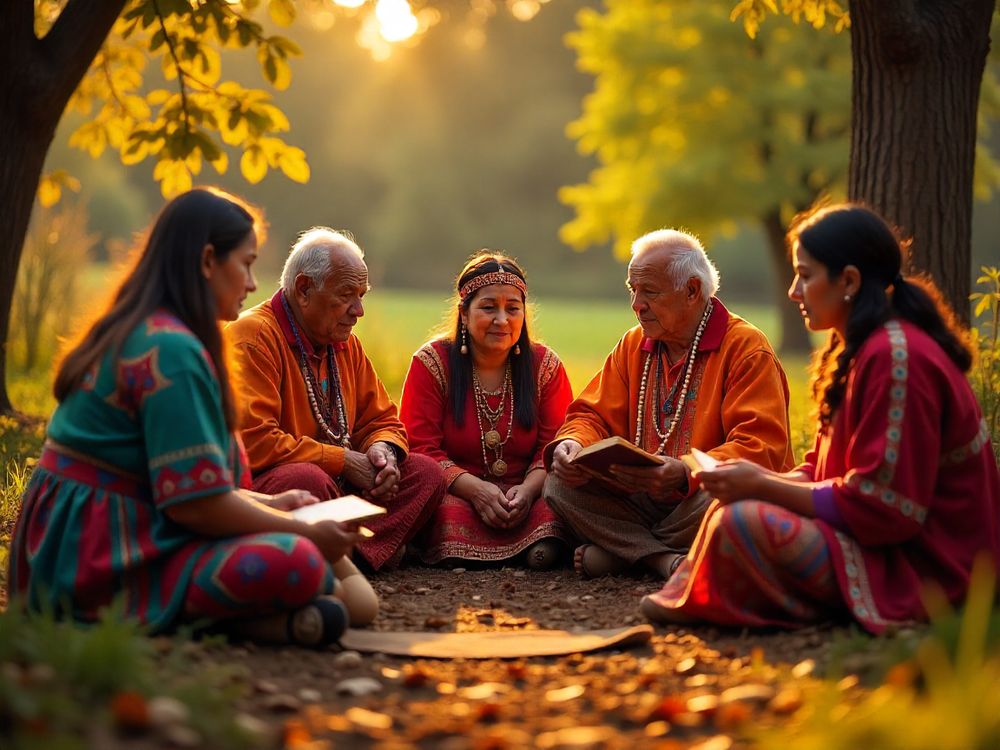Indigenous Wisdom and Dementia: What the West Is Missing
Marco Aurélio Gomes Veado
3 min read
•
August 28, 2025
In recent decades, dementia has become one of the fastest-growing public health challenges worldwide. In the West, scientific research has made enormous strides in understanding Alzheimer’s disease, vascular dementia, and other cognitive impairments. Yet, despite the billions invested in medical research, prevention and care strategies often overlook something invaluable: the deep, community-based wisdom of Indigenous cultures.
From the Amazon to the Australian outback, Indigenous peoples have developed approaches to aging and cognitive health that are rooted in connection to nature, to tradition, and to community. This holistic perspective could offer the West essential tools for both dementia prevention and dignified care.

Community Connection as Cognitive Protection
One of the most striking differences between many Indigenous cultures and Western societies is the way elders are valued. In Western countries, aging can often be associated with isolation, retirement from active life, and, in many cases, loneliness. By contrast, Indigenous elders are often central figures in their communities, respected as keepers of history, language, and cultural knowledge.
Social engagement and a sense of purpose are well-documented protective factors against cognitive decline.
By embedding elders into everyday community life, Indigenous traditions naturally provide the mental stimulation and emotional connection that brain health experts encourage.
What the West can learn: Prioritize intergenerational activities, community roles, and storytelling opportunities for older adults to maintain cognitive engagement.
Holistic Health Practices
Indigenous health systems often integrate mind, body, and spirit, with a strong emphasis on balance. Many incorporate natural remedies, dietary traditions, physical activity through daily life, and spiritual practices that reduce chronic stress — a major risk factor for dementia.
For example:
- The Inuit traditionally consume omega-3-rich diets from fish and marine mammals, known to support brain health.
- The Māori of New Zealand incorporate group rituals, song, and movement, reinforcing both memory and social bonds.
- Amazon communities use plant-based medicines alongside community healing ceremonies that strengthen mental resilience.
What the West can learn: Consider holistic care models that address emotional well-being, diet, and cultural identity alongside medical interventions.
Language and Memory
Indigenous languages are often deeply descriptive and symbolic, requiring speakers to engage multiple cognitive domains. Learning, preserving, and using a rich, complex language can be a form of mental exercise that strengthens neural connections.
Research shows that bilingualism and continued language learning can delay the onset of dementia symptoms. For many Indigenous elders, storytelling in their native tongue is both a personal joy and a mental workout.
What the West can learn: Encourage language learning, whether Indigenous or otherwise, as a lifelong cognitive practice.
Nature as Therapy
In Western dementia care, nature-based therapy is gaining attention, but Indigenous cultures have never lost this connection. Daily interaction with the land, whether fishing, farming, gathering, or walking, is not only physically beneficial but also mentally grounding.
Being in nature reduces stress hormones, improves mood, and enhances cognitive performance. This is not an occasional wellness activity in Indigenous life; it’s woven into the fabric of daily existence.
What the West can learn: Incorporate regular outdoor activities and green spaces into dementia care facilities and community programs.
Respect, Not Romanticization
While Indigenous traditions offer valuable insights, it’s important to approach this knowledge with respect and collaboration, not appropriation. Working with Indigenous leaders, researchers, and caregivers ensures that wisdom is shared in a way that benefits both communities without erasing cultural identity.
Conclusion
Bridging Indigenous wisdom with Western science could lead to a more humane, effective, and inclusive approach to dementia care. As we face a future where dementia cases are expected to triple by 2050, it’s time to widen our lens, recognizing that prevention and care are not only about medication and diagnostics but also about connection, culture, and respect.
Subscribe to our Biweekly Newsletter and follow MCI and Beyond for science-based insights, and share to spread awareness.
#DementiaCare #IndigenousWisdom #AlzheimersAwareness #BrainHealth #HolisticHealth #ElderCare #IndigenousKnowledge #MemoryCare #NeuroHealth #CognitiveWellness #MCIandBeyond
Sign up for our newsletter!
Get the latest information and inspirational stories for caregivers, delivered directly to your inbox.

